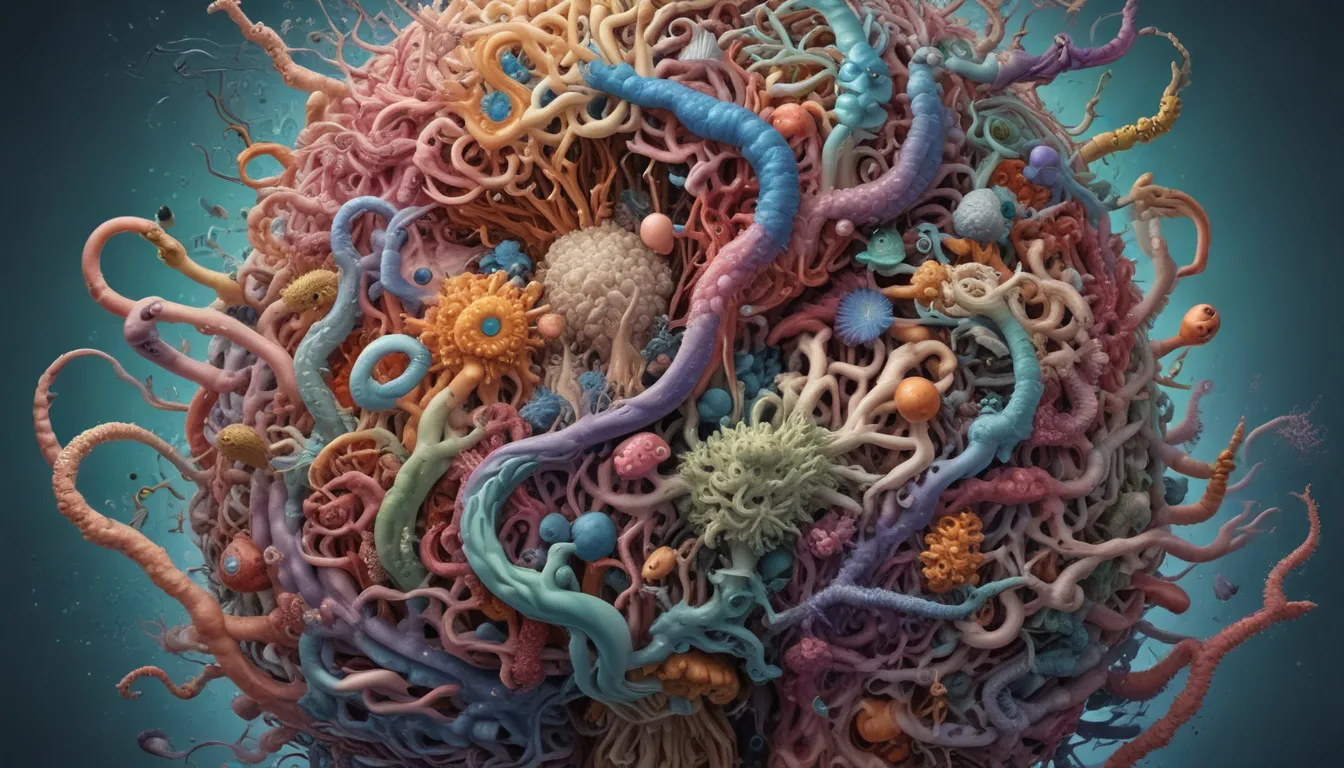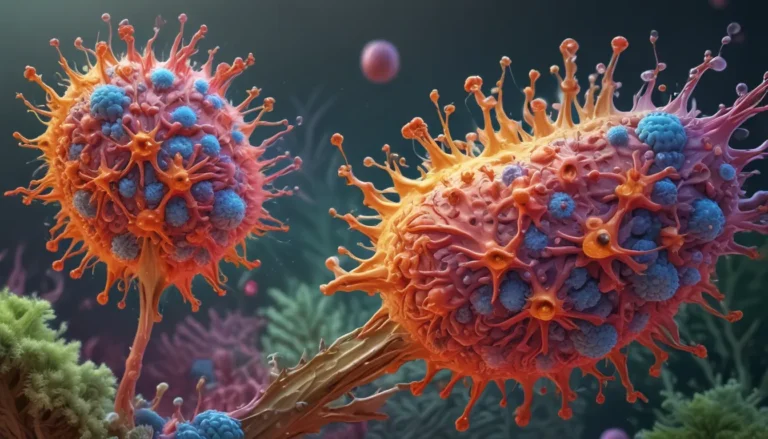A Note About Images: The images used in our articles are for illustration purposes only and may not exactly match the content. They are meant to engage readers, but the text should be relied upon for accurate information.
From the moment we are born, trillions of microorganisms find a home within our bodies, creating a vast and intricate ecosystem known as the microbiome. These microscopic beings, including bacteria, viruses, fungi, and other microbes, play a crucial role in shaping our health and well-being. The study of the microbiome has garnered significant attention in recent years, revealing astonishing insights into its complexity and significance. In this article, we will delve deep into the world of the microbiome, exploring 16 captivating facts that will not only expand your knowledge but also illuminate the profound impact of these tiny inhabitants on various aspects of our lives.
Unlocking the Mysteries of Microbiome
The human body serves as a sanctuary for trillions of microorganisms, each possessing its distinct fingerprint within the microbiome. These microscopic inhabitants are not mere passengers; they actively participate in essential bodily functions, including digestion, immunity, and even mental health. A diverse microbiome, influenced by genetics, diet, and environment, is essential for maintaining optimal health. Conversely, imbalances within the microbiome can pave the way for various diseases. Unraveling the power of the microbiome has the potential to revolutionize healthcare by offering innovative approaches to preserving well-being.
Traversing the Microbial Landscape
The Astonishing Diversity of the Human Microbiome
The human body hosts a vast array of microorganisms, creating a diverse ecosystem within us. From the gut microbiome, crucial for digestion and immune function, to the skin microbiome, safeguarding against pathogens, each component plays a vital role in maintaining our health.
The Gut Microbiome: A Digestive Powerhouse
Among the various microbiomes, the gut microbiome reigns supreme, residing in our digestive system and orchestrating processes like nutrient absorption and immune regulation. The intricate balance within the gut microbiome is influenced by factors such as diet, lifestyle, and genetic makeup, underscoring its significance in overall well-being.
Nurturing the Garden Within
Cultivating Microbiome Diversity
A diverse microbiome is synonymous with good health outcomes. By fostering a varied microbial community, we can bolster our immune defenses and shield ourselves against disease. The symbiotic relationship between the host and microbiome is a delicate dance that requires nurturing.
Probiotics: Guardians of the Microbiome
Introducing probiotics, live bacteria and yeasts with health benefits, into our diet can restore the microbial harmony within our bodies. These beneficial microorganisms aid in promoting digestive health and rebalancing the microbiome, paving the way for optimal well-being.
Impacting Health Beyond Digestion
The Mind-Gut Connection
Research has uncovered a profound link between the microbiome and brain function through the gut-brain axis. This intricate connection showcases how the microbiome influences mental health, emphasizing the importance of nurturing a balanced microbial landscape.
Microbiome Imbalances: A Path Towards Disease
Dysbiosis, or microbial imbalances within the microbiome, has been associated with various health conditions, including inflammatory bowel disease, diabetes, and autoimmune disorders. Understanding and addressing these imbalances are pivotal in preventing disease onset.
Nurturing the Microbiome from Birth
The Origins of Microbial Colonization
Microbial colonization commences at birth, with newborns acquiring microorganisms from their mothers during delivery. The method of delivery, whether vaginal or cesarean, influences the initial composition of the microbiome, shaping the foundation of our microbial ecosystem.
Breastfeeding: A Blueprint for Microbiome Health
Breast milk is a treasure trove of nutrients, including prebiotics that foster the growth of beneficial bacteria in the infant’s gut. This early interaction with the microbiome through breastfeeding lays the groundwork for a healthy and robust microbial community.
Embracing the Future of Microbiome Research
The realm of microbiome research is a realm of endless possibilities, with new discoveries and advancements unfolding continually. Unraveling the mysteries of the microbiome holds the key to revolutionizing healthcare and developing personalized strategies for enhancing human health and well-being.
Conclusion: Illuminating the Microbial Universe Within Us
In closing, the microbiome represents a mesmerizing labyrinth within our bodies, intricately woven into the fabric of our health and well-being. By comprehending the nuances of the microbiome and embracing its profound impact, we pave the way for transformative advancements in healthcare. As we venture deeper into the realm of microbiome research, we unearth opportunities for promoting personalized medicine and optimizing health outcomes.
FAQs: Unveiling Microbiome Insights
-
What is the microbiome? The microbiome encompasses a collection of microorganisms, including bacteria, viruses, fungi, and other microbes, residing within and on the human body.
-
How does the microbiome influence human health? The microbiome plays a pivotal role in various aspects of human health, ranging from digestion and immunity to mental well-being.
-
Can we alter the microbiome? Yes, the microbiome is susceptible to influences such as diet, medications, environment, and lifestyle choices. However, maintaining a delicate balance within the microbiome is essential.
-
How does the microbiome impact digestion? The microbiome aids in nutrient breakdown, absorption, and protection against harmful pathogens, contributing significantly to digestive health.
-
Is the microbiome linked to mental health? Ongoing research suggests a connection between the gut microbiome and mental health conditions such as depression, anxiety, and neurodegenerative disorders.
-
Are there strategies to boost microbiome health? Consuming a diverse, fiber-rich diet, incorporating probiotic-rich foods, managing stress levels, and avoiding unnecessary antibiotic use can support a healthy microbiome.
-
Can the microbiome be personalized for individual health needs? Research on personalized microbiome therapies, including fecal microbiota transplantation (FMT), holds promise for treating specific conditions.
-
How does the microbiome interface with the immune system? The microbiome acts as a shield against pathogens, training the immune system to respond effectively. Disruptions in the microbiome can lead to immune dysregulation and heightened infection susceptibility.
In wrapping up our exploration of the microbiome, we invite you to continue your journey into the captivating world of the microbiome, discovering its intricacies and potential for improving human health. By nurturing this intricate ecosystem within us, we pave the way for a healthier and brighter future.





